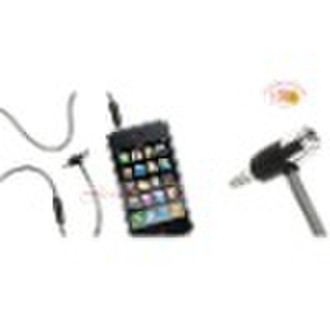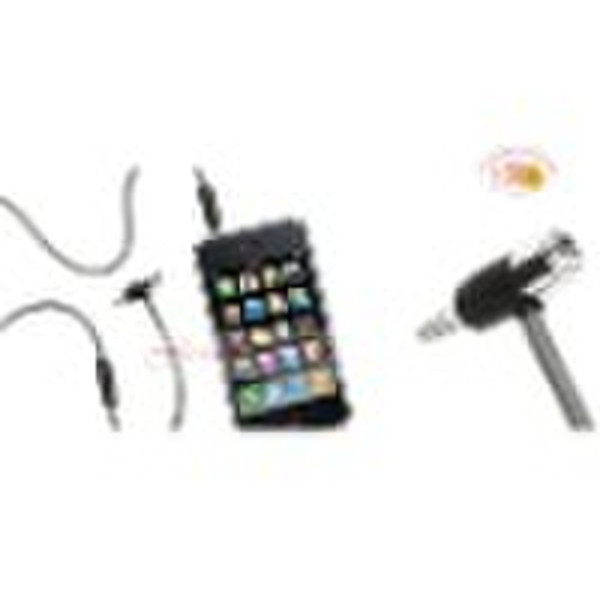Catalog
-
Catalog
- Agriculture
- Apparel
- Automobiles & Motorcycles
- Beauty & Personal Care
- Business Services
- Chemicals
- Construction & Real Estate
- Consumer Electronics
- Electrical Equipment & Supplies
- Electronic Components & Supplies
- Energy
- Environment
- Excess Inventory
- Fashion Accessories
- Food & Beverage
- Furniture
- Gifts & Crafts
- Hardware
- Health & Medical
- Home & Garden
- Home Appliances
- Lights & Lighting
- Luggage, Bags & Cases
- Machinery, Hardware & Tools
- Measurement & Analysis Instruments
- Mechanical Parts & Fabrication Services
- Minerals & Metallurgy
- Office & School Supplies
- Packaging & Printing
- Rubber & Plastics
- Security & Protection
- Service Equipment
- Shoes & Accessories
- Sports & Entertainment
- Telecommunications
- Textiles & Leather Products
- Timepieces, Jewelry, Eyewear
- Tools
- Toys & Hobbies
- Transportation
Filters
Search
FS09036 for iPhone AUX Cable with Handsfree Microp

Joy Wang
Contact person
Basic Information
| Place of Origin | Guangdong China (Mainland) |
|---|---|
| Model Number | FS09036 |
FirstSing FS09036 for iPhone AUX Cable with Handsfree Microphone•Hands-free microphone for iPhone & many other smartphones •Doubles as an AUX cable for high-quality audio •Zero-setup, zero-configuration; just plug, play and talk •Incoming call pauses the music on your for iPhone and sends call to your car’s speakers •Hands-free mic and inline switch make it easy to answer and talk while you keep both hands on the wheel•Slender plug design so you can keep your for iPhone in the case when you plug inTechnical Specifications •Cable Length: 35.4″ (90 cm) •Type: Stereo audio cable, 1/8″ stereo-mini jacks •Microphone: high-sensitivity condenser •Compatibility:for iPhone 4G,for iPhone 3GS and for iPhone 3G •Requires your for iPhone to be running for iPhone OS 3.0 or higherProduct Review:Now that an increasing number of states are cracking down on driver cell phone use, it is becoming more of a necessity to go hands-free while behind the wheel. FirstSing has just introduced a simple, but effective way to turn your car stereo into a hands-free speakerphone. How it works: Think of this device like an auxiliary cable with a built in microphone. It simply sends audio from the phone to your cars speakers. This means it can be used for playback of music as well as phone calls. There is a small microphone on the connector that picks up your voice during calls. In order for this cable to work you will need a car with an aux input, and a cell phone with a 1/8th-inch mini-jack output. The good news is that more and more car stereos are coming with such a connector, the bad news is the input must be on the front of the stereo. If it is in the glove box or center console, the microphone will not be able to pick up your voice. Build quality: The device is compact, has an in-line call answer/end button (similar to for iPhone headphones), and is of very high quality. FirstSing even went so far as to include helpful tags showing users what end to plug into the stereo, and what to plug into the phone. Nice touch.Call quality: Incoming sound quality was excellent. I could hear callers loud and clear through my cars speakers. Outgoing sound quality was not nearly as good. When I was stationary, callers said I sounded far away and they needed to turn their handset volume up all the way. When I was in motion, 35 miles per hour, they said it was very difficult to hear me. To be sure it was not just an isolated case, I called three people who all reported the same troubles when I was en route. Conclusion: There are many variables when it comes to hands-free calling inside a moving vehicle. Electrical noise can negatively impact call quality, as does road noise. If the microphone sensitivity is turned up too high, callers will hear nothing but road noise. If it is set too low, they will have trouble hearing you. While I could hear callers very well, they could not hear me and were anxious for me to “take them off speakerphone.”
Payment term
Telegraphic transfer
MoneyGram
Paypal
Western Union
-
Payment Methods
We accept:









